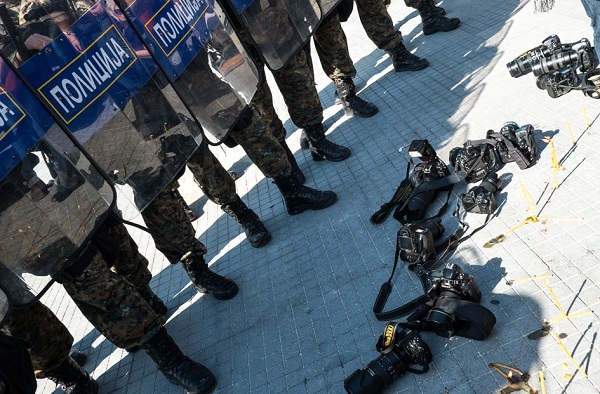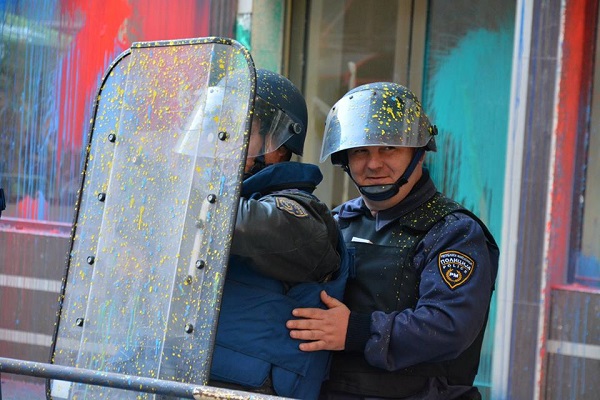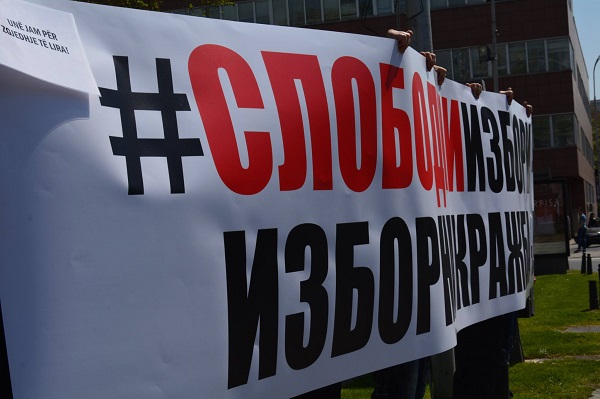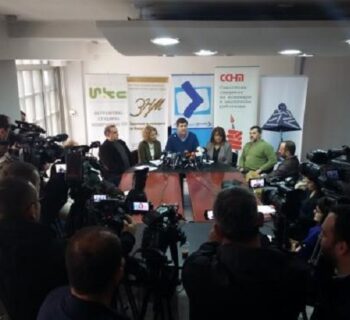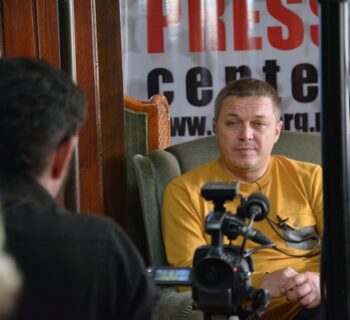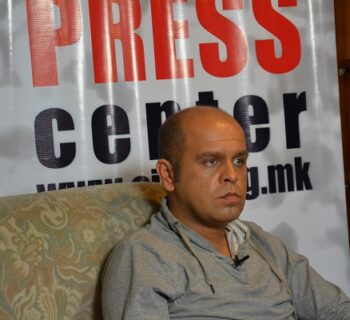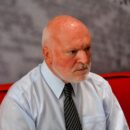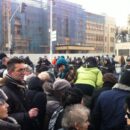Republic of Macedonia is experiencing media darkness for years. On the World Press Freedom Day, once more, we raise our voice, striving for freedom. We reiterate our strong condemnation of the government’s policies and practices in the media sphere.
The government has shut down the critical A1 TV station on the night of November 26, 2010, using over 200 special police officers. Along with the TV station, police has shut down three daily newspapers (“Vreme”, “Spic” and “Koha e re”). This was not the beginning of fierce media control, but was most certainly an introduction to a new era of Macedonian media. It is an era of almost complete control over the media in the country, era of demonization of critical journalism and of continuous violence against all those who have dared to speak and report differently from the propagandistic Catechism of the government.
On the ominous day of December 24, 2012, journalists were forcefully expelled from the press gallery of the Assembly of the Republic of Macedonia, after which members of the opposition were also expelled, unseen precedents in Europe’s more recent history, which have brutally violated the Constitution and the laws.
Journalist Tomislav Kezarovski was persecuted and imprisoned for two years just because he conscientiously performed his journalistic duty – to inform the public.
The editor and owner of the only independent political weekly magazine “Focus”, Nikola Mladenov, died in a car crash, under extremely suspicious circumstances.
The government has been wire-tapping conversations of dozens of journalists and public figures for years, and from some of the conversations that were published by the opposition, we were able to hear how media darkness was being established in Macedonia.
In the wiretapped conversations, revealed by the opposition in 2015, we heard how an editor of a pro-government TV station, in a conversation with a minister in the government, called the news of the television station in which he is the editor with the words “condom news”, referring to the omnipresence of government figures in the programme. An owner of another servile TV station, “confesses” to the head of a security service that he would rather turn off the electricity in the TV station, so a contracted TV show (by an independent production), would not run on his TV station.
In the past three years, the automobiles of several journalists and analysts have been set on fire, as a clear threat and pressure for their actions.
There have also been several cases of physical assaults and death threats against journalists and editors of independent media in the country. However, there are no results or conclusions from investigations carried out for any of the cases.
Journalist Sase Ivanovski was physically assaulted by Deputy Prime Minister Vladimir Pesevski. The minister has not been held responsible for this.
Journalist Zoran Bozinovski is persecuted, accused for espionage, and is now being held in custody.
The Agreement for overcoming the political crisis, signed in Przino (June 2 and July 15), put media freedoms high on the agenda. Government representatives have fiercely defended their positions in the negotiation process in this area in particular, for the purpose of maintaining control over the media.
Reforms in the media are completely blocked, whereby the proposal of the international mediator Peter Vanhoutte for urgent steps to free the media from the constraints of the parties in power was firmly rejected. The mediator himself suffered a bombardment of attacks by the government, the ruling party’s leader and pro-government media in public.
All relevant international and domestic institutions and organizations have been talking for years of the dramatic decline of media freedom, and have ranked Macedonia as a non-free country.
CIVIL has made numerous recommendations and demands in the past years. Not one recommendation or demand has had a positive outcome.
The media serve the government in maintaining its propaganda machinery, mass clientelism and structural violence in Republic of Macedonia. Macedonia has sunk in media darkness and structural violence. This has to stop now!
Therefore, CIVIL is urging the democratic public and all freedom-loving citizens of the Republic of Macedonia, to defend their right, by all means allowed by the Constitution and laws, to be objectively and professionally informed.
CIVIL is also urging the international community to call upon the authorities in the country to immediately stop with the propaganda and media control, and to take immediate and strict measures for sanctioning the government officials, according to the international laws and standards.
 Македонски
Македонски Shqip
Shqip English
English
